The Best Cities for Expat Mental Wellbeing
The world’s best places for expats to live based on mental wellbeing research
Slowly, conversations around mental health are becoming more common. Propelled by the pandemic and a subsequent increase in the number of people seeking support, the stigma around mental health is being broken down.
Whilst the life of an expatriate may be the dream for many, it is no secret that living overseas comes with its own challenges. Homesickness, lack of familiarity, developing self-sufficiency, and culture shock are all elements of relocating to another country that affect mental wellbeing.
Having provided expats around the world with international health insurance for over 20 years, Expatriate Group wanted to explore mental wellbeing within the community. With studies revealing that expats face a high overall risk of mental health problems, the team examined the wellbeing credentials of cities popular with expats to reveal the best places to live and work overseas for increased mental wellbeing.
- The world’s best places for expats to live based on mental wellbeing research
- The world’s best cities for avoiding Seasonal Affective Disorder
- The world’s most active cities
- The world’s best cities for quality sleep
- The world’s cities with the most green space
- The world’s best cities for work life balance
- The cities where expats are the happiest around the globe
- The world’s most expat friendly cities
- The world’s best cities for expat healthcare
- Conclusion
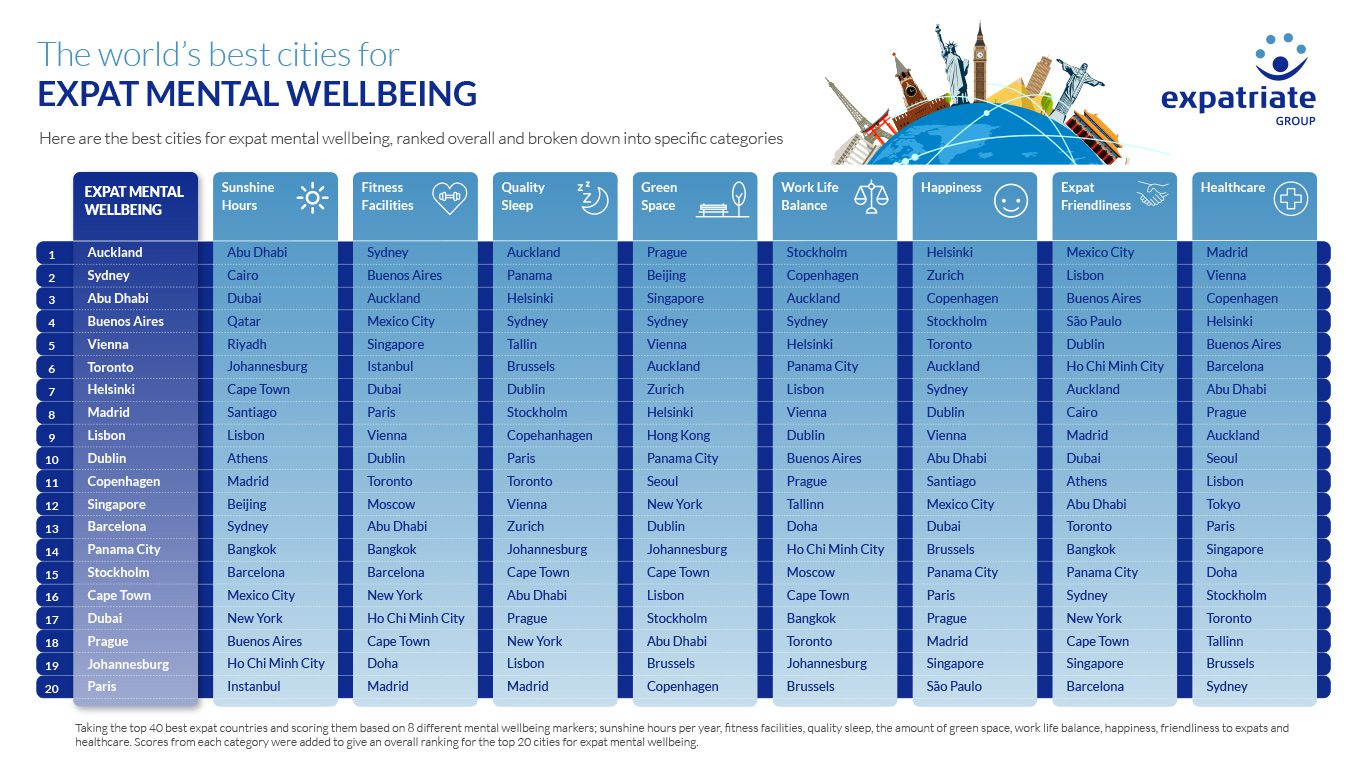
We took the top 40 best countries for expats and scored them based on eight different mental wellbeing markers: sunshine hours per year, fitness facilities, quality sleep, the amount of green space, work life balance, happiness, friendliness to expats and healthcare. Scores from each category were added to give an overall ranking for the top 20 best places for expats’ mental wellbeing.
Auckland, in New Zealand’s North Island, topped the list as the best city to live for expat mental wellbeing. As one of the country’s three capital cities, it is no surprise that Auckland is culturally diverse and has a thriving expat community.
Out of the eight elements of expat life that could have an impact on mental wellbeing, Auckland came in the top ten in all but one. Whilst the city may not have the most sunshine hours, expats are promised a good night’s sleep, a fantastic work life balance, and access to countless fitness facilities. It is also one of the cities expats feel most happy in, likely due to the fact Auckland ranked in 7th position for expat friendliness. As well as plenty of green spaces and healthcare both featuring in the top 22% of all cities analysed, life for expats in Auckland offers the best for expat mental wellbeing.
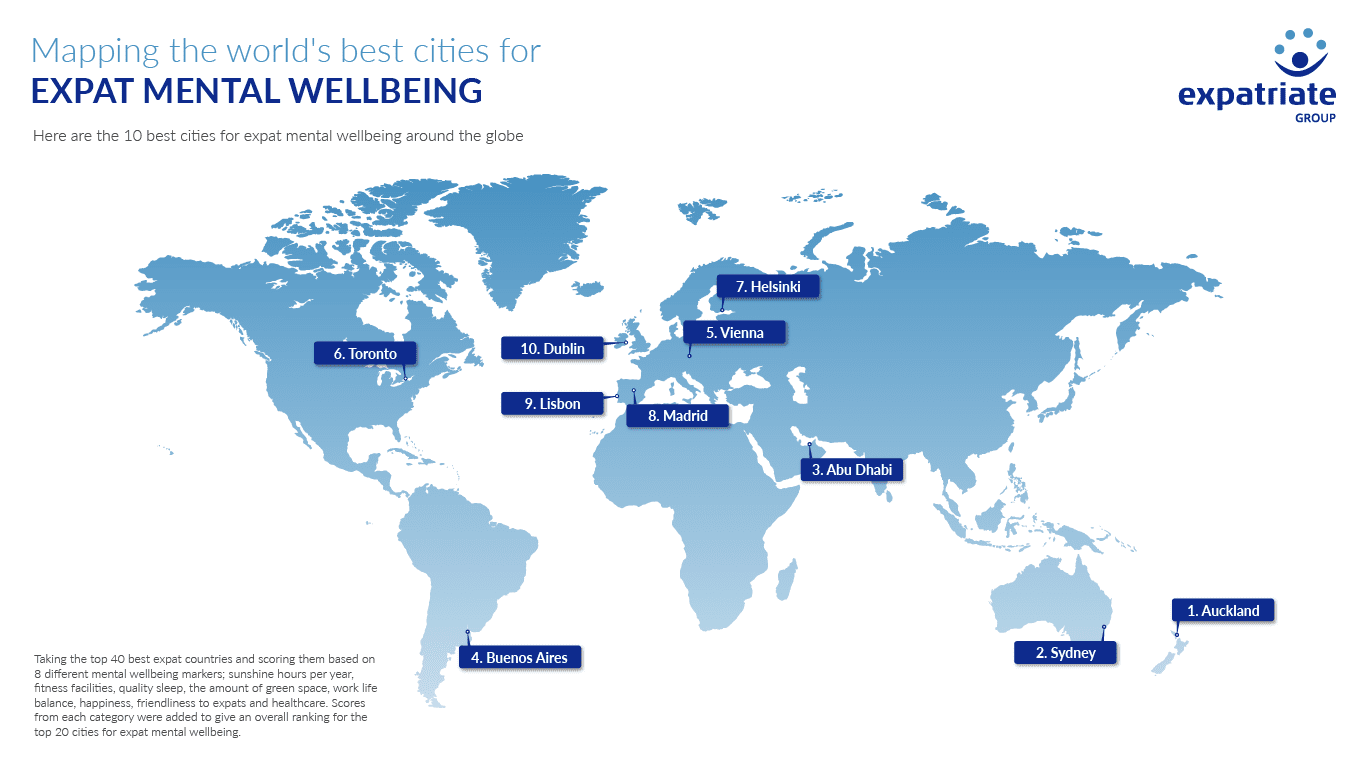
The world’s best cities for avoiding Seasonal Affective Disorder
Much more than just the ‘Winter Blues’, Seasonal Affective Disorder, or seasonal depression, is a complex condition which sees individuals’ mental wellbeing affected by shorter hours of daylight. There are higher diagnosis rates of SAD in countries further away from the equator. This is due to there being fewer hours of sunlight, particularly during the winter months. For example, in the UK, January and December receive under eight hours of daylight on average. Around three in every 100 people are affected by SAD as some point in their life.
When can SAD occur?
Exposure to sunlight helps control our hormone levels. Melatonin (which regulates our sleep-wake cycle) and serotonin (which stabilises our mood and increases our happiness) rely on sun exposure to keep our bodies working as they should. Lack of sunlight causes the levels of these hormones in our bodies to drop, which is why expats experience seasonal depression in the winter even if they are otherwise happy and healthy.
Which expats are more susceptible to Seasonal Affective Disorder?
Expats who move from sunnier climates, particularly those in their 20s and 30s, are at a higher risk of SAD. However, it can occur in any expat – it is all dependant on genetic makeup and hormone levels. A reduction in sunlight can also trigger existing conditions such as depression or bipolar in expats due to the lack of melatonin and serotonin being produced.
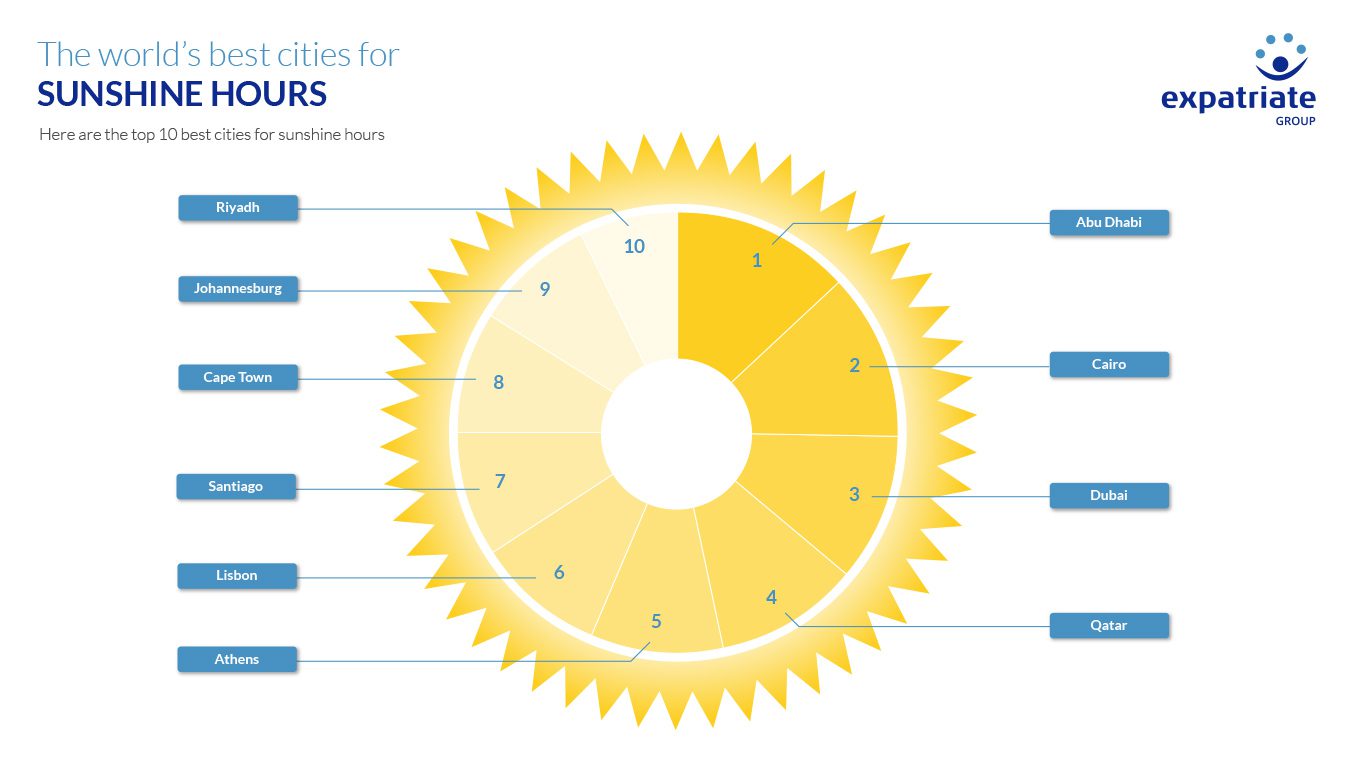
The sunniest cities in the world
Getting some sun increases your serotonin and melatonin levels due to the chemical reactions taking place in the body. Moving overseas to a sunnier climate can help stave off Season Affective Disorder. During our research, it was revealed that the sunniest city in the world is Abu Dhabi, with a staggering 3,838 hours of sunlight per year – that’s an average of 10.5 hours per day! The UAE capital came out on top as the best city for expats to move to beat SAD. Cairo in Egypt followed in second place with 9.7 hours of sunlight per day and the third spot went to fellow UAE location Dubai, where expats can enjoy around 9.6 hours of sunlight per day.
Cities making up the top 10 for sunniest places to live for expats include Doha, Riyadh, Johannesburg, Cape Town, Santiago, Lisbon and Athens.
The world’s most active cities
We all know that being active is good for physical health, but did you know it can improve your mental wellbeing too? When you exercise your body releases endorphins which interact with the receptors in the brain. This is why people typically feel fantastic after physical activity. Regular exercise can also help promote:
- Clear thinking
- Sharper memory
- Higher self-esteem
- Better sleep
- More energy
- Stronger resilience
Furthermore, for expats that live with depression, anxiety, high stress levels, ADHD and PTSD, incorporating exercise as part of a healthy lifestyle can help alleviate symptoms. Even just a 20-minute workout or physical activity a day can help to improve an individual’s mental wellbeing.
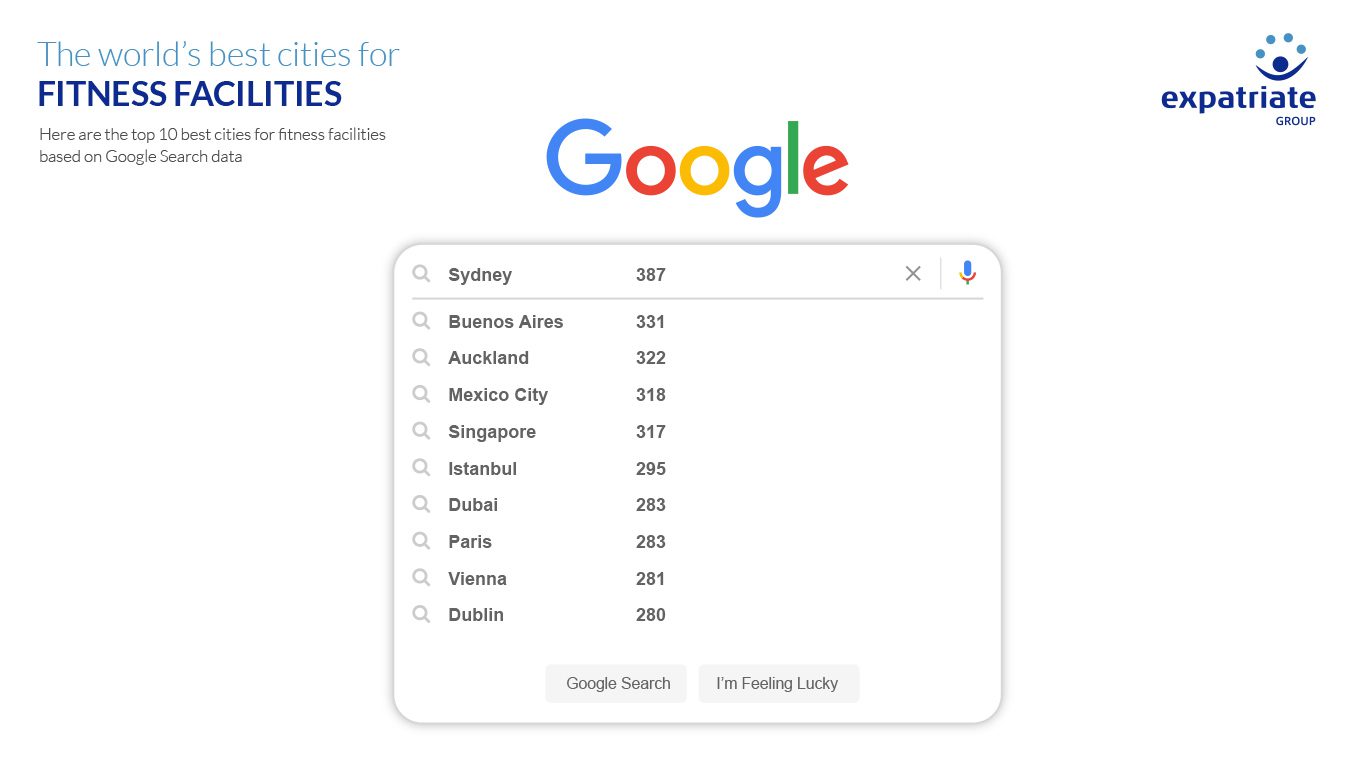
Cities with the most gyms and fitness facilities
Expatriate Group recognised the importance exercise plays in expat’s lives, particularly when it comes to mental wellbeing. We set to work, analysing the top 40 expat cities to see which had the most to offer expats. Using Google Search data, the team were able to find the expat cities which had the most fitness facilities.
Renowned for an outdoor lifestyle, Sydney in Australia is the top city for expats wanting to improve their mental health and wellbeing with physical activity. As well as countless gyms and fitness studios offering everything from Bikram yoga to CrossFit, it’s also a fantastic city for walking, cycling, hiking, swimming, and climbing. For expats who want to make their exercise regime super social, there are sports clubs at all levels to join too.
Sydney was always going to be a hard city to beat when it comes to fitness facilities and it’s Buenos Aires in Argentina that comes in second place. Walking, running, jogging and roller skating are firm favourites with locals and expats alike. Head to Bosques de Palermo or the Costanera Sur’s Ecological Reserve – they both have dedicated routes for those who like to enjoy the great outdoors when they exercise. There’s also countless gyms, yoga groups, bootcamps, dance studios, and sports clubs that expats are welcome to enjoy too.
Auckland, Singapore, Dubai, Paris, Vienna, Dublin, Toronto, and Abu Dhabi make up the top 10 expat cities for fitness facilities.
The world’s best cities for quality sleep
Having a good night’s sleep is as important to our health as eating, drinking, and breathing. When we sleep our bodies repair themselves and our brain processes information that is absorbed in the day. Lack of quality sleep can not only wreak havoc on your physical health but mental wellbeing too.
You will often have felt irritable or unhappy during the day if you haven’t had ample quality sleep. However, over a period of time poor quality sleep can lead to stress, depression, anxiety, and complex psychiatric conditions if left unmanaged. In short, sleep problems can lead to changes in mental wellbeing. However, it’s a vicious cycle, as mental health changes can also impact sleep quality further.
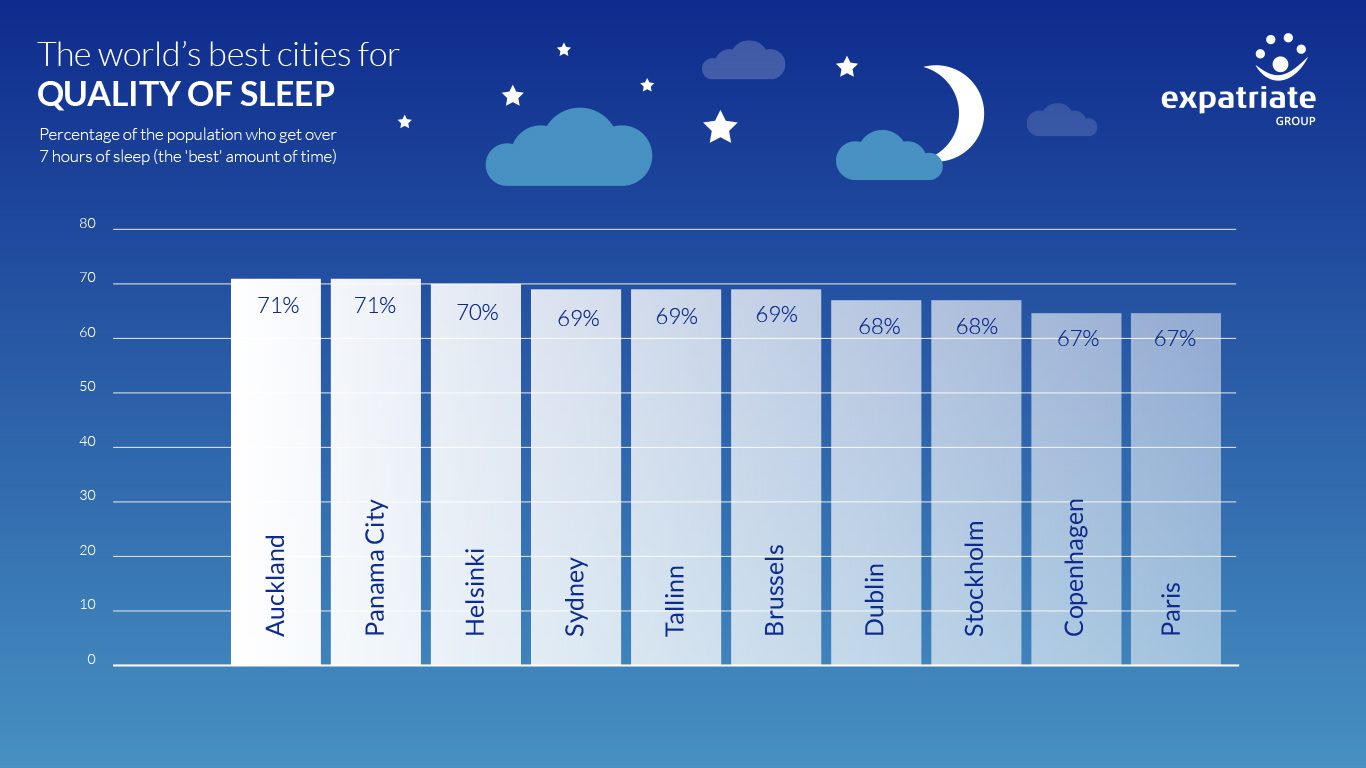
Cities with the highest quality sleep
Moving to a new country can be both exciting and challenging for expats, which is why we wanted to find the best cities for expats to have quality sleep night after night. We took a dive into sleep app data and discovered that expats will have the best night’s sleep in Auckland. The majority of adults in the city get between seven and nine hours sleep per night – the perfect amount for good physical and mental wellbeing according to science. Panama and Helsinki ranked in second and third places, with expats expected to have a sound nights’ sleep in these cities too.
The world’s cities with the most green space
It’s incredibly important to have green spaces in cities. Not only do they improve the air quality and mitigate environmental health risks that can come with city life, they’re also valuable for our mental wellbeing too.
Having access to green spaces has proven to alleviate stress, improve social interaction and create a better sense of community. They can also provide a space for city dwellers to take part in physical activity, which we have already seen can greatly contribute to better mental wellbeing. Green spaces in cities can be of particular benefit to those in the community who may be socially or financially disadvantaged and may have less access to high-quality green spaces.
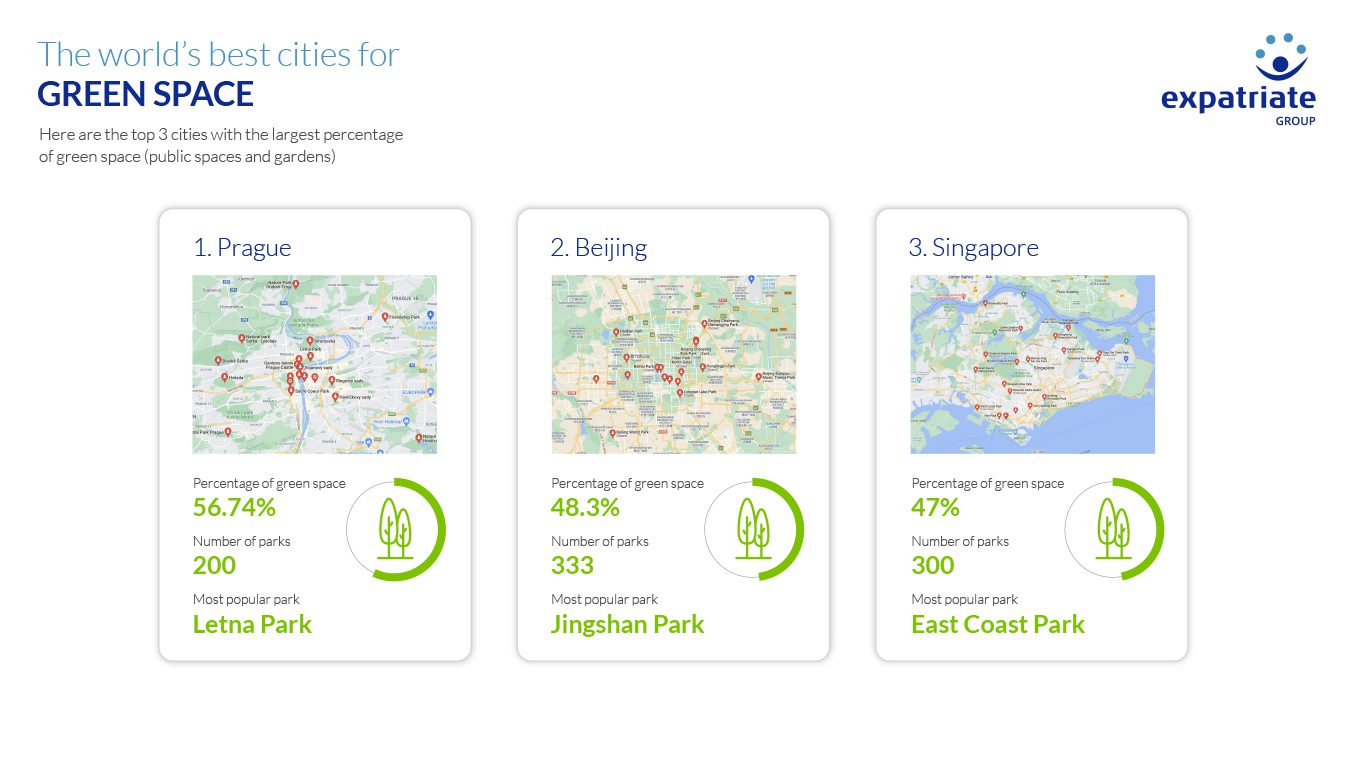
The cities with the most green space
Our research found the percentage of land in cities dedicated to public parks and gardens. Prague came out top with the most green spaces, with much of the city covered in gardens, parks and orchards. Not only did the Czech Republic capital have the most area covered in public parks, but it also boasts a high diversity in its green spaces, with expansive woodlands, large open parks, smaller orchards and walled historic gardens. These spaces are often used for sporting, cultural and social events, offering expats a chance to relax and take a break from the stress of city life.
Beijing is close behind Prague for most area covered by green spaces. The city has taken great strides in recent years to add thousands more hectares of urban green spaces. In the past decade, they have planted more than 54 million trees to improve the city’s forest coverage and a number of urban forests and leisure parks have been built. Expats in Beijing can now find many more places to enjoy their leisure time. Singapore came in third place for most green spaces, with over 300 km of ‘green corridors’ running throughout the city. This has seen an increase in visits to parks as well as increase in residents walking and cycling.
Sydney, Vienna, Auckland, Zurich, Helsinki, Hong Kong and Panama City make up the rest of the top 10 for most green spaces.
The world’s best cities for work life balance
A good work life balance is essential to mental wellness. A healthy work life balance will look different for every individual, but with the convenience and immediacy of technology it’s becoming more difficult to separate work from our personal lives. This has been especially prevalent for expats, with the majority reporting that they had a better work life balance in their country of origin.
The work culture of a country will contribute to whether workers can achieve their ideal work life balance. This is important to maintain an individual’s relationships with others, as well as reducing the health problems associated with stress. People with a better work life balance can also avoid symptoms of burnout, which can include exhaustion and even depression.
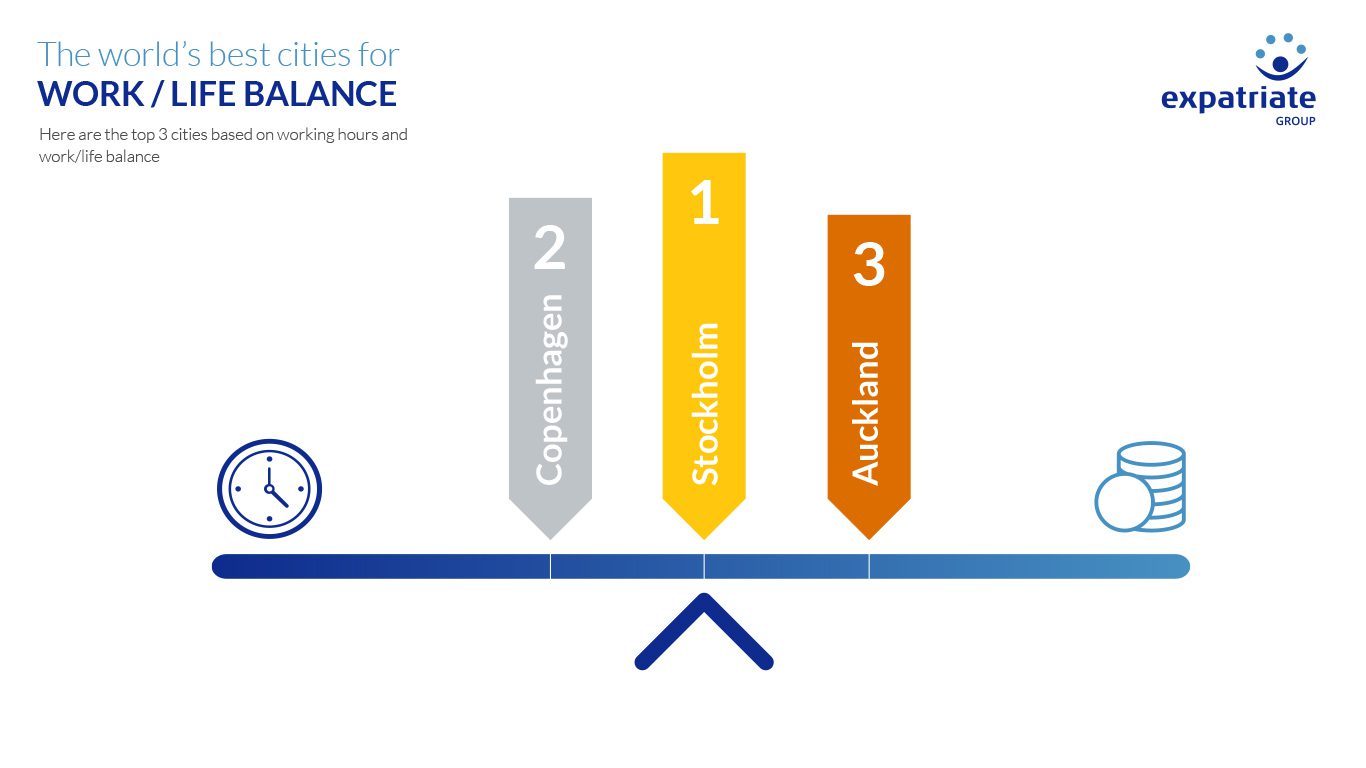
Cities with the best work life balance
Expats self-evaluated their work life balance and working hours, giving both factors a rating to amount to a total work life balance score. It was no surprise that Stockholm topped the list, with Sweden taking a flexible approach to working hours and workers’ schedules. Working parents in Stockholm are often able to make time for the school run or to make a family dinner, arranging their working hours around these times. Parents are also granted ‘vab’ where they are able to take the day off work to look after their sick child – with the government reimbursing 80% of any lost wages. New parents get 480 days of parental leave, which can be shared between both parents as they wish – men are actively encouraged to stay at home to help raise children. Only around 1% of people in Sweden work more than 50 hours a week, instead making the most of their free time for leisure activities. Expat employees in Stockholm are entitled to a minimum of five weeks paid vacation per year.
Copenhagen is the second-best city for work life balance. Whilst the Danes are notoriously hard workers, working extra hours over the country’s official 37-hour work week is discouraged. If an employee is sick, they are dissuaded from coming in to work; instead, they are asked to stay home and recover. Employees in Copenhagen and the rest of Denmark are also entitled to five weeks off per year, and offices are often closed in the last weeks of July when people enjoy the short Danish summer. Whilst there is a focus on supporting family life in Copenhagen, single people are also encouraged to make the most of a healthy work life balance, with many people taking part in sporting activities, socialising and volunteering.
Auckland, Sydney, Helsinki, Panama City, Lisbon, Vienna, Dublin and Buenos Aires make up the rest of the top 10 cities for work life balance.
The cities where expats are the happiest around the globe
A good way of assessing someone’s mental wellbeing is to ask them to judge for themselves how happy they are. Evaluating happiness is subjective, but factors that can contribute to how happy an individual feels with their life can include their freedom, generosity, absence of corruption from the city and social support. Living in a pleasant environment and minimal money concerns will also likely factor in to a person’s happiness.
Whilst it’s not an exact science, if a person states that they are happy with their quality of life, it follows that their mental wellbeing is also in a good place. Where you live will have a huge effect on your happiness and expats often report that living in another country has improved their overall quality of life. Factors like improved and trusted governments and better, cleaner city life often outweigh any of the negative effects of culture shock.
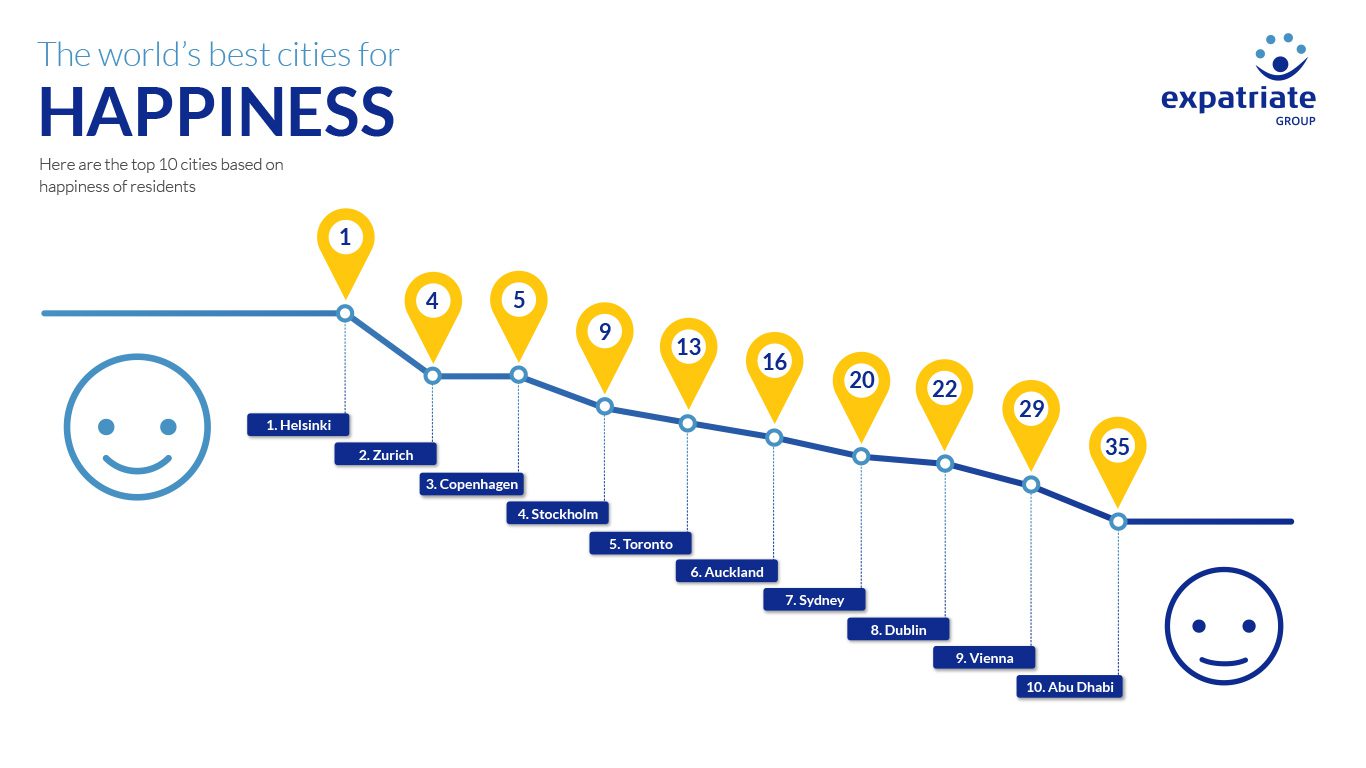
The world’s happiest cities
Residents of each city were asked to self-evaluate their own happiness and the results were then ranked to try to find the happiest places to live for expats. What makes someone happy will depend on what matters are important to them and people were asked to evaluate their own quality of life based on their own judgements.
The top 10 was dominated by Nordic cities, with Helsinki coming top for the happiest residents. Helsinki is aiming to become “the most functional city in the world”, with the city’s mayor stating that its citizens will become happy when they have the best possible conditions for urban life. Helsinki expats have easy access to numerous, quality services in the city and residents are often able to contribute to the planning of city development. Helsinki is a particularly safe city, bringing peace of mind to residents. There is a general sense of trust in the police and the authorities in Helsinki. The Finnish welfare state contributes to lower stress levels, in turn contributing to individual happiness. Expats in Helsinki feel cared for and are, on the whole, able to live with less discontent and anxiety.
Zurich came second for the happiest city in the world for expats. It’s Europe’s richest city and a major business hub. As such, it’s a highly efficient city and with beautiful, clean and calming surroundings. Expats in the city enjoy a high quality of life with amenities designed to the highest standard. Zurich is known for high wages and head-hunted expats often also receive an education allowance for their children – alleviating the stress that comes with money-worries. Zurich also has a very low crime rate, with residents feeling safe around the city.
Copenhagen comes in third for happiest city, with the healthy work life balance contributing to people’s overall happiness. The city itself is known for being bright and welcoming and the Danish people are generally very accepting. Denmark is the origin of “hygge”, which no doubt contributes to feelings of happiness in the nation’s capital. Although there’s no direct English translation, hygge can be summed up by a sense of cosiness, comfort and living your most joyous life.
The rest of the top 10 is made up with Stockholm, Toronto, Auckland, Sydney, Dublin, Vienna and Abu Dhabi.
The world’s most expat friendly cities
Moving to a new city can be incredibly daunting, with the difficulty that comes with learning a new language and social etiquettes. But when the locals are friendly and welcoming, the process of adapting to a new country is so much easier.
Knowing that people may be more accepting and gracious if you make any social faux pas can really take the pressure off and ease stress levels. If locals are friendly to expats, you are also more likely to quickly find a group of friends; being around people you feel comfortable with can help you to really settle into a new city and make it feel like home.
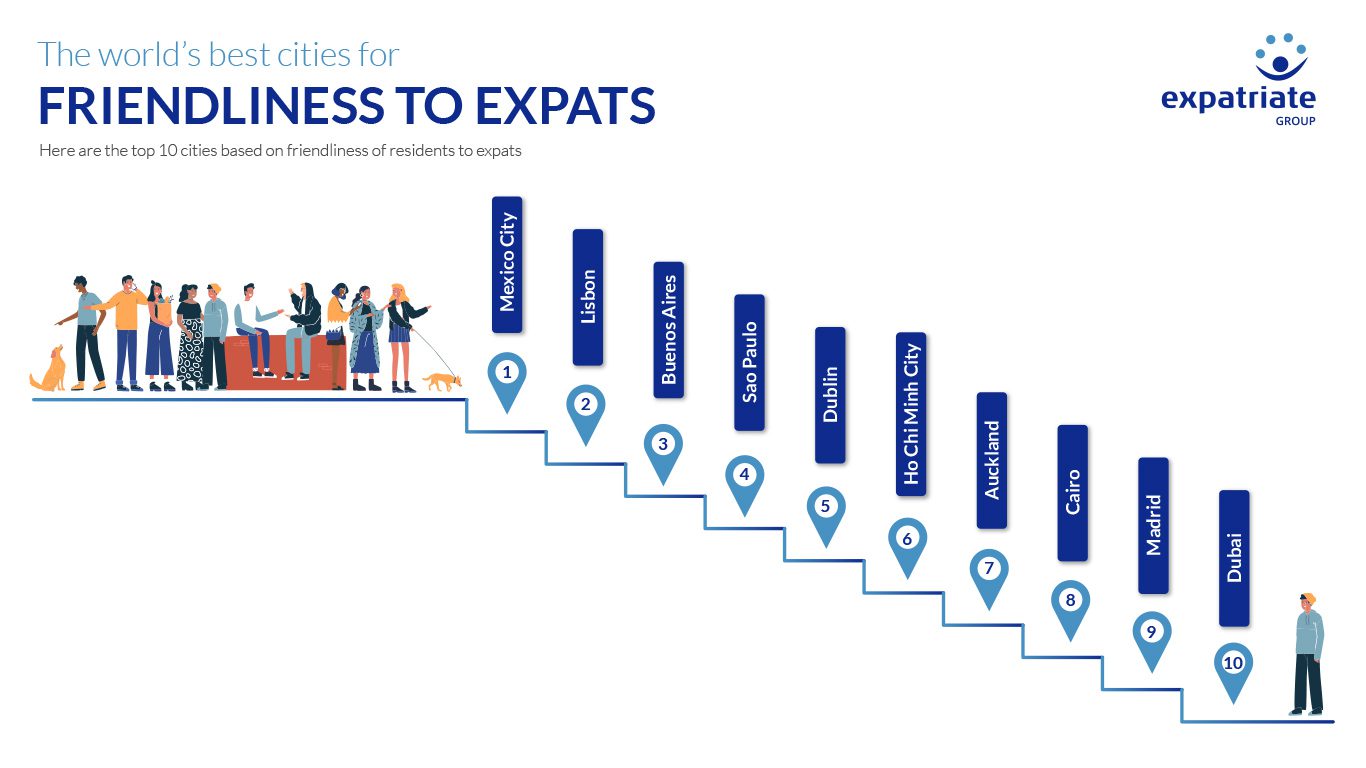
The friendliest cities for expats
Expats were asked to rate the general friendliness of the population, as well as how welcoming the locals are to foreigners. The ratings were then combined for an overall score to find the friendliest cities in the world for expats. Mexico City came first from the ranking, which may be surprising to some. You may have heard horror stories about safety in Mexico, but whilst there are some regions to avoid as an expat, the majority of people in Mexico City are immensely welcoming to foreigners. Expats in Mexico City cite the locals who are happy and willing to help them find the right public transport and are patient with language mishaps. The city is divided into neighbourhoods that each have their own distinct atmosphere. So, expats are able to find like-minded locals, whether they’re looking for a more active neighbourhood, or something calmer.
Lisbon is next on the list for cities that are friendly to expats. The Portuguese capital is a diverse city, home to a large expat community, families and students. Locals are used to dealing with foreigners and are extremely welcoming. Expats have reported that estate agents and landlords are also very helpful to expats, making it easier to find a place to live. Portuguese culture is focused on the family and expats find it easy to meet people through work or the family of their children’s friends.
Buenos Aires is third for the city most friendly to expats. The locals in Buenos Aires are renowned for being warm and hospitable. Expats who have been lucky enough to make friends with local people report that they’re honoured to have relationships with such sociable and laid-back people. The city welcomes foreigners with open arms, helping expats to immediately feel at ease.
São Paulo, Dublin, Ho Chi Minh City, Auckland, Cairo, Madrid and Dubai make up the rest of the top 10 most expat friendly cities.
The world’s best cities for expat healthcare
Access to healthcare is extremely important to wellbeing. Not only is it vital to have access to treatments for mental health, but problems with physical health can bring on depression and anxiety if treatment is not readily available.
Combined with the possibility of a language barrier when wanting to access healthcare, the quality of healthcare for expats is a huge contributing factor to expat’s wellbeing. Cities with excellent healthcare systems have treatments that are readily available and healthcare staff that have been trained to a high standard.

The cities with the best healthcare for expats
Expats were asked to rank the quality and availability of healthcare in their city. Madrid is reportedly the best city in the world for expat healthcare. It has a large number of public facilities as well as an excellent private sector. Free access to the high-quality healthcare system is available to every resident paying into social security. There are many public hospitals in Madrid, as well as smaller healthcare centres and pharmacies. Many expats choose to use the private healthcare system as this usually offers more extensive and quicker treatment options.
Vienna came in second for the best healthcare for expats. Healthcare in Vienna is generally affordable, easily accessible and of a high standard. The public healthcare in Vienna is excellent and Austria has one of the best healthcare systems in the world. Everyone living and working in Vienna has access to free healthcare and employees will automatically be enrolled for public health insurance. Even so, many expats choose to pay for private healthcare to reduce waiting times. There are many well-stocked pharmacies around Vienna, in convenient locations.
Copenhagen is third for cities with the best expat healthcare. There is a universal healthcare system in place in Copenhagen, with all residents having equal access to treatments. The majority of people use this public healthcare system in Copenhagen as it is of such high quality, but there is a small number of private facilities available.
Helsinki, Buenos Aires, Barcelona, Abu Dhabi, Prague, Auckland and Seoul make up the rest of the top 10 for expat healthcare.
Conclusion
Many factors can affect an individual’s mental wellbeing, and expats face a myriad of extra circumstances that can have an impact on their lives. There is no one definitive way to assess mental wellbeing. But when combined, the various environmental and emotional factors we’ve analysed can help us to understand what cities might be the best places for expats to live for better mental wellbeing.
There is no perfect city for expats. Whilst New Zealand ranks top overall, it is in the bottom 50% for sunny days, meaning people could be more prone to SAD than other locations. However, on balance, the city should promote better health and wellbeing for its expat residents.
Methodology
Aspects that contribute to better mental wellbeing were first defined and categorised. Environmental factors were chosen for how they can positively affect mood and health, like hours of sunlight in a day, the average night’s sleep, the number of fitness facilities available, and the percentage of land dedicated to public green space. For this quantitative data, research was conducted online to find the statistics for each city.
Emotional data was also used, with expats ranking their own satisfaction with aspects like their own work life balance and happiness, their opinion on the available healthcare, and how friendly the locals have been to expats in their city. The emotional data was given equal weighting to the factual statistics.
Sources
- https://happiness-report.s3.amazonaws.com/2020/WHR20_Ch3.pdf
- https://en.wikipedia.org/wiki/List_of_cities_by_sunshine_duration
- http://www.worldcitiescultureforum.com/data/of-public-green-space-parks-and-gardens
- https://urbanmobilityindex.here.com
- https://www.dailymail.co.uk/sciencetech/article-3042230/Sleeping-habits-world-revealed-wakes-grumpy-China-best-quality-shut-eye-South-Africa-wakes-earliest.html